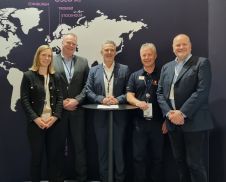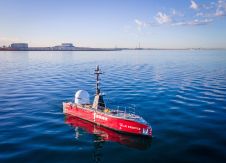International Geosurveying: the Perfect Job
Interview with George Darling, Gardline Group Chairman
The growing offshore exploration of the 1980s led to a booming need for survey-ships and many vessel-operating companies were founded, sometimes with only one old vessel. Saturation of the market resulted; many could no longer meet increased special and technical requirements for modern surveys and so disappeared, went bankrupt, were sold or merged with a bigger operator. Some, however, broadened their scope, modernised their fleet and sailed successfully into the international surveying business, offering not only hydrographic, geophysical, cable-route and EEZ-surveys but also oceanographic, environmental, geotechnical, data-processing and charter services. We interviewed the founder and present chairman of such a company.
How did it all start, where were you in your career at that time and who are you now? Where does the name Gardline originate from?
I bought my first ship in 1969, having previously owned and sold two companies that I started from scratch. It was my intention to move to Australia, due to high taxation rates in the UK at the time. However, currency export restrictions forced me to stay in the UK, so I ended up owning a few ships, which proved to be a good investment.
Today I am chairman of the Gardline Group, a diverse group of companies specialising in marine geophysical, geotechnical and hydrographic surveys, satellite communication and marine satellite TV.
The name Gardline is an anagram of my surname, ‘Darling’ with an extra e. It was the brainchild of one of my very first secretaries. I remember asking her to think of a suitable name for the company while I was out of the office on business. I telephoned the office a couple of days later from a phone-box on the Manchester moors - it was freezing cold - and when she explained her idea I agreed that it sounded great. I wasn’t too sure when I started to thaw out in the car on my way back to the office, but by then it was too late!!!
Gardline is more than just a survey company. Can you briefly describe the development of Gardline and the various companies in the group?
Gardline Shipping was founded in 1969 as a shipping company, to provide marine support for a flourishing offshore oil & gas industry in the North Sea. Gardline has developed over the past forty years into much more than simply a survey company.
The seabed survey business remains Gardline Group’s largest single activity. However, we have developed business in other areas, such as satellite communication and marine satellite TV, and security, which are now significant contributors also. There are four specific reasons behind such a broad range of investments. 1) We thought it would be wise to be less dependent on the hydro-carbon business, as activity levels frequently go up and down. 2) Other businesses show a better return on company investment. 3) The power of oil & gas companies is now such that it is difficult to get a reasonable return for the services we provide and 4) we found it easy to expand external activities based on extensive knowledge gained from our core business.
In fact, there are not so many independent, full-scale surveying companies. Who are your competitors? How do you respond to the many take-overs by some large companies? What are feelings in the market regarding these?
Gardline’s number one competitor is Fugro, which over the years has acquired many survey companies: Svitzer and Thales to name but a few. Today we remain the largest independently owned survey company in the world, and will continue to maintain this status. It has been necessary for a rationalisation programme to take place because of the high level of capital investment required to remain successful within the industry. We welcomed this programme, as we shall at least be in business competing with public companies that will be obliged to charge a realistic price for their services and not accept unreasonable and predatory clauses imposed on them by their clients. Hopefully the market will now start to settle down and at last we can look forward to realistic and sensible trading.
How do you see the prospects for a young surveyor today wanting to found his/her own company? Can he do as you did?
There are great opportunities for any young person to found their own company, providing they are prepared to put in the work - and by that I mean lots of it! I left school at fourteen; the war cut short my education. However, I had the self-drive and the business head needed to found and run a successful business. When I first started, my company provided ships to survey companies, but in 1974 I created my own survey division. I owned and operated nine ships in total, and I handled the day-to-day operations, from client liaison, marketing and sales to getting my hands dirty in the ships’ engine rooms. I had one ship superintendent, one accountant and a few office-team members.
A businessperson today needs a lot of foresight, an intense ambition to be successful and total dedication, all irrespective of family considerations. I strongly believe that you really have to enjoy your work. Commercial considerations apart, I can’t think of a more enjoyable way to spend my day… And I am well into my 70s!
Gardline is doing much work for the MCA (Maritime and Coastguard Agency) under long-term contracts, and carried out UNCLOS-surveys (EEZ delineation) for Norway and Namibia, among others. What is the proportion of these Gardline government contracts to those in the private sector, and how dependent are you upon such contracts?
Nautical charting and UNCLOS activities have accounted for approximately 20% of annual turnover to date for 2004/5. Whilst we are not dependent on these activities, they represent an important contribution to the company's business and, importantly, are not subject to the vagaries of oil price and associated peaks and troughs in market demand and supply.
Can you say something more about these government clients, for example regarding supervision, observers on board, and quality control?
This varies with the client. Nautical charting surveys tend to be remotely supervised and quality control is applied rigorously by the contractor; however, final deliverables are subject to close scrutiny by the end user. UNCLOS surveys use seismic industry models for onboard supervision and quality control standards throughout.
In the past you were very active in chartering out vessels for survey work. What happened to this activity?
We have been and always will be very active in survey contracts – this is, after all, Gardline’s core business. We are always looking for opportunities to market our vessels outside the oil & gas sector.
Gardline has recently procured Triton , a revolutionary ship design. Do you have an internal research and development department assisting with the design and equipping of such a ship, or do you rely on manufacturer developments? Can you comment on the ship and your operational plans for her?
No, we don’t have an internal research and development department to assist with the design of a ship, but we remain in close contact with shipbrokers and shipbuilders who in return provide advice and guidance. However, we have enough experience of ships to realise that, at 90 metres in length and with a beam of 22.5 metres, Triton ’s unique trimaran design and state-of-the-art control systems place her at the leading edge of vessel technology. In addition to these features, other important factors in Gardline’s purchase of the vessel included Triton ’s size, modern design and state-of-the-art vessel management instrumentation; Gardline views these as a sea-change in ship design, making the vessel an ideal platform for future survey operations and charter opportunities in new markets. Initial modification plans by Gardline include installation of a survey sensor suite, including Kongsberg Simrad EM1002 multi-beam echo sounder, GPS attitude/heading system, surface navigation and ultra-short baseline sub-surface acoustic tracking system, echo sounder, Voyager5 (Gardline’s new-generation Integrated Survey System) and Caris post-processing system. Following conversion the vessel will commence hydrographic survey work for the Civil Hydrography Programme (CHP). This programme will probably commence in the UK Western Approaches on behalf of GMSL’s client, the government agency responsible for safety of navigation, and CHP sponsor, the MCA.
Apart from one road transportable vessel, Gardline operates big survey vessels. Does this imply you are mainly interested in long-term, ‘high-seas’ survey work?
This is not so; Gardline is constantly looking to diversify: we see the expansion into near-shore work as a natural progression and we are hopeful of increasing our small-vessel fleet accordingly. Certainly, the lessons learnt on our larger ships and our support staff/facilities will greatly assist our near-shore operation company Gardline Environmental in securing more of this highly specialised market.
Do you experience a positive input in offshore survey contracts from Oil & Gas companies caused by still-soaring oil prices?
Yes and no; it is clear that the high price of oil has had a positive knock-on effect to our business in terms of more work, but not higher rates! But we will not see this benefit for another twelve to eighteen months, as our work lags behind the exploration work currently being conducted or designed. However, we note that some of the profits published by the majors recently will be issued as share dividends: perhaps understandable. Having said that, we are hopeful that frontier areas, such as East Africa, will see increased activity as the need for new finds increases.
Do you expect another breakthrough in techniques, perhaps comparable to the one of multi-beam in the past, for hydrography in coming decades?
Of course, I fully expect new technical breakthroughs. Technology within this industry is constantly evolving and that is what makes it extremely exciting and interesting.
The environment is receiving much public and government attention at the moment. How does this affect your work as a private survey company?
Gardline is expanding its environmental services to reflect new legislation and new clients. Therefore we are excited about the environmental aspect; this is very much an important growth area of our business.
Regarding human resources: are you still able to fill vacancies with the qualified persons you are looking for?
We receive on average five to ten CVs per week. We are extremely active in recruitment; we advertise in university publications and attend various career fairs. Students are familiar with Gardline and are well aware of the opportunities we offer. We also run regular job vacancies on our website and candidates can download an application form and email our HR department direct.
With the introduction of more and more automation, what sort of changes do you expect to face ship-borne hydrographic personnel, and the surveyor? Will hydrography in the near future be carried out from the office?
Today, hydrographic personnel, such as the surveyor, definitely need to be multi-disciplined for example; data processors and technicians’ skills need to be interchangeable. No, I don’t think hydrography in the near future will be carried out from the office, not as long as the current trend is for more processing to be undertaken offshore.
Finally, is there any other message you would like to get across to our readers?
Commercial considerations make this a difficult business to be in however, those aside, this is still a very enjoyable and interesting industry and can provide anyone with a passion for hydrography the perfect job. I sometimes say that this is not so much a business, it’s more like an incurable disease!

Value staying current with hydrography?
Stay on the map with our expertly curated newsletters.
We provide educational insights, industry updates, and inspiring stories from the world of hydrography to help you learn, grow, and navigate your field with confidence. Don't miss out - subscribe today and ensure you're always informed, educated, and inspired by the latest in hydrographic technology and research.
Choose your newsletter(s)
























